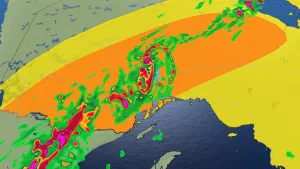
Winter 2023-2024 shattered records as Canada's warmest ever
Canada is among the fastest warming regions in the world due to climate change.
A new analysis of this past winter shows that it was the hottest ever recorded across Canada, beating out the previous hottest winter by the widest margin ever seen.
Environment and Climate Change Canada's Climate Trends and Variations Bulletin — Winter 2023/2024 was released by the agency this month. Tallying up the impacts of the season, the report finds that the average temperature from December 2023 to February 2024, across all of Canada, was 5.2°C above the 1961-1990 average.
SUMMER 2024: Get an in-depth look at the Summer Forecast, tips to plan for it, and much more!
That is now the warmest winter ever recorded for Canada since 1948, beating out the previous record (4.1°C from Winter 2009-2010) by 1.1°C. This also represents the largest record-over-record increase the agency has ever seen in their data.
"Normally in my field of work, you break a record by 0.1°C, maybe 0.2°C," says Bob Whitewood, the Climate Change Science Advisor for Environment and Climate Change Canada. "To break it by a whole degree is beyond anything I've seen before."

This graph of winter average temperatures across Canada from 1948 through 2024 reveals just how much warmer this past winter was compared to the rest. The red line shows the general trend of the temperatures as they rise due to global warming. (Environment and Climate Change Canada)
"With the exceptions of 2014 and 2022, average winter temperatures have remained above the baseline average since 1996. The linear trend indicates that winter temperatures averaged across the nation have warmed by 3.6°C over the past 77 years, increased by 0.2°C compared to the last winter," the ECCC report reads.
READ MORE: Earth just experienced its hottest 12 months in recorded history
As for the cause of this extremely warm winter, climate change certainly played a role in it, Whitewood said. What's hard to say is whether it was the only driver.
"We know that there was an El Nino. We know that tends to warm up the planet," Whitewood said. "But there is also above-normal temperatures in all the oceans around Canada."
"Is this the first step of the ocean not being able to absorb as much heat as it has in the past, or is it just a phenomenon of fluctuations in the normal climate system?" Whitewood added.
Not just Canada
Canada wasn't the only country that felt the heat this winter. According to NOAA, it was the warmest December to February period for the globe, going back to the year 1850. The past 10 winters, along with winters 2006-2007 and 2009-2010, are the 12 warmest winters ever seen in that 175 year record.

This map plots the temperature departure from the 1991-2020 average across the globe for December 2023 through February 2024. While there were some regions experiencing temperatures significantly below average, most of the globe saw above average temperatures, with the greatest anomalies above the baseline seen across the Arctic, central and eastern Canada, and the mid-west and northeast of the United States. (NOAA NCEI)
The most intense heat — the greatest departures from the average temperature from 1991-2020 — was felt across much of North America and the Arctic, though.
Header image: Canva/Cheryl Santa Maria.











